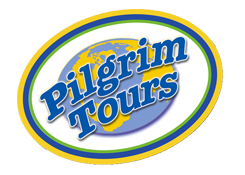

Click on the tabs for more information
Price Per person double occupancy
| Dates |
|---|
| Request a quote or call 800-322-0788 for more information. |
|
Ask About Special Rates for Pastors, Christian Educators, & Custom Groups of All Sizes. No Obligation Group Quotation - Click Here |
Click here for "Frequently Asked Questions"
Price Includes: First class (4 Star) lodging, breakfast and dinner daily, modern transportation, sightseeing as listed.
Not Included: Flight departures (low cost fares available nationwide), fuel charges, air taxes, travel/cancellation insurance, Turkey visa fee (U.S. $30.00 / Canada $60.00 USD) See information below.
Please Note: Turkey Entry Visas* must be secured in advance prior to arrival. Visas can be obtained in advance online at the link below.
*Turkey “E-Visa” online purchase - Click Here
Airport transfers are included only when airfare is purchased from Pilgrim Tours. Taxi service is available for those purchasing their airfare elsewhere.
Day 1: Departure from US
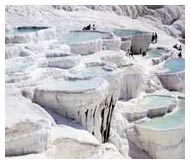
Today we embark on our Journey to the lands of ancient treasures and Christian history with an overnight flight to Turkey. Prepare yourself for a life-changing experience. Get some rest on the flight…Tomorrow you will be walking where the apostles walked!
Day 2: Arrive Turkey
Arriving in Denizili, we transfer to the spa village of Pamukkale, our lodging for the next two evenings, where the remainder of the afternoon is free for you to relax and enjoy a leisurely dinner.
Day 3: Hierapolis, Colossae & Laodicea
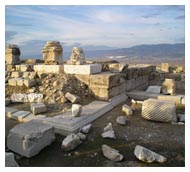
Hierapolis, meaning "Sacred City," was an ancient center for pagan cults until it was transformed into a Christian center in the first century. According to tradition, the Apostle Philip lived and was martyred in Hierapolis. It was the likely the hot springs of Hierapolis in contrast to the cold mountain springs near Colossae that combined to bring application to the "luke warm" Laodiceans. (Rev 3:14-22) This connection between the cities lies behind Paul’s reference to Hierapolis and Laodicea in his epistle to the Colossians (Col 4:13). Colossae is well-known throughout Christian circles as the receiver of Paul's letter to the Colossians. Today, the town has fallen into obscurity and nothing remains. Laodicea contains many acres of ruins to visit including a stadium and remnants of a sophisticated water system.
Day 4: Philadelphia, Sardis, Thyatira, Smyrna
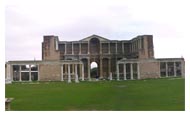
Philadelphia was referred to as the "New Jerusalem" (Rev. 3:7-13) in the Book of Revelation, yet today, not much is left of the city except for the ancient wall and the remains of a Byzantine basilica in the modern city of Alasehir. Sardis was berated by John for its facade of strength when in reality; it was weak (Rev. 3:1-6). Here coins were minted and the dyeing of wood originated. We'll visit the gymnasium and synagogue. A stop will be made in Thyatira to view the ancient roadway and period columns. Izmir is the third largest city in Turkey and a long time center for Jews and Christians. In Paul's day, Izmir was known as Smyrna and was another of the Seven Churches (Rev. 2:8-11). Here we'll see Polycarp's Church and the ancient agora. Our lodging the next two evenings will be in Izmir.
Day 5: Ephesus
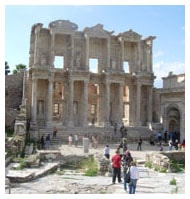
This morning we visit the Church of St. John for a tour and a scenic overview of the Ephesus area. From here our guide will point out the location of the ancient harbor of Ephesus and describe the silting process that led to the demise of this important Roman city. Of special interest is the tomb of John and the baptismal where new believers were immersed. We will also be able to view the site of the ancient wonder - the Temple of Artemis and the nearby Mosque of Jesus (Jesus is a respected prophet to Muslims). This afternoon we’ll view a wealth of artifacts awaiting us at the Museum of Ephesus and visit the archeological site of Biblical Ephesus, which hosts a large restoration effort and miles of ancient treasures. Ephesus was once a thriving port town of 250,000 people. Today you can still see the spectacular excavations of the major streets in this ancient city where we view the Library, Agora, Temple of Artemis, theatre, colorful mosaics, a panoramic view of the surrounding ancient port area including a wealth of church history and cultural insight. The day will not be complete without a visit to a local Turkish Rug cooperative.
Day 6: Pergamum & Alexander Troas

Once a busy trading center and famous as a "seller of purple," the most favored of the Seven Churches, the church of Pergamum was praised for its forbearance (Rev. 2:12-17). It was here that the first Christians were executed by Rome. We'll visit the fabled Acropolis, pass through the Royal Gates, view the foundations of the Temple of Zeus and visit the ruins of the library, which once held 200,000 volumes. We continue our sightseeing in Alexandria Troas, which was once a city with tall buildings and a major port on the Aegean. This is noted as the inspiration and beginning of the spread of Christianity into Europe. It was here that Paul had a vision during his second missionary journey and was called to Macedonia (Acts 16:8-13). Paul later spent a week in Troas preaching here and Eutychus was resurrected (Acts 20:6-12). Our lodging this evening will be in picturesque Çanakkale.
Day 7: Turkey to Greece – Arrive Kavala
We set off traveling west to Greece. After a drive across the area known as “Trace,” the European portion of Turkey we arrive at the border. Continuing on we arrive in Kavala, Greece's prettiest mainland port with a most elegant harbor. Paul landed here with his disciples, Timothy and Silas. Luke, the Evangelist, also came here from Troas. This ancient city of Neapolis was later renamed Christoupolis because it was the first European city to accept Christianity. Imagine walking on the same sod as these men of the Bible! We will see the Roman Aqueduct and the ruins of the Acropolis in this beautifully located city, known since the 5th century as Kavala. We overnight in this lovely seaport town.
Day 8: Philippi, Thessalonica
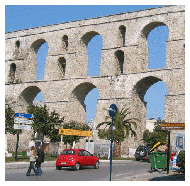
This morning we make the short trip to Philippi where Paul preached his first evangelical sermon and baptized the first Christians on European soil. We will view the baptismal site where Lydia surrendered her life to Christ and visit a crypt dating from the Roman period that is thought to have served as a prison for Paul. See the famous Acropolis, the Market Place, Basilica, and the Theatre. We travel west following the coast arriving in Thessalonica, Macedonia the evening. The New Testament books of I & II Thessalonians will come alive to us today. En route to the hotel we will view the old city ramparts; the newly excavated Forum, St. George Church, an ancient Roman monument which was transformed into a church and the Galerius Arch which rises over the famous Via Egnatia. We visit St. Demetrius basilica, dedicated to a distinguished member of the Roman army and a martyred Christian convert before arriving at our hotel for the evening in Thessalonica.
Day 9: Berea/Athens
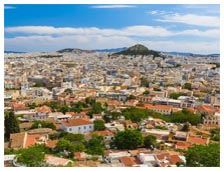
A stop will be made in Berea to view the ancient synagogue where Paul spoke and the Bema surrounded by mosaics of Paul and the plaque of scripture regarding the "more noble" church. Driving through town we see remnants of the original Roman road that spanned the nation during Paul’s time. We also visit King Phillip's (Alexander's father) tomb in Vergina, one of the most outstanding finds in all of Greece. The exhibit includes many items including intricately designed lavish gold crowns designed for the royalty of the day. This afternoon we continue southward past Thermopylae and on to the city of Athens, the birth place of democracy and our home for the next three nights.
Day 10: Athens

We begin our day with a visit to the Acropolis, the Parthenon, and Erectheum before viewing Athens atop Mars Hill where Paul stood and preached the truth to the Gentile nation. The remainder of the day is free with many things to do and see. A short walk from your hotel is the famous Plaka with a multitude of shops and cafes.
Day 11: Corinth
Departing Athens, we stop for a rest stop and photos at the Corinth Canal and then travel to the ancient city of Corinth, another treat for the New Testament scholar. Corinth is the city that inspired many of Paul's most familiar letters. See the Archaeological Museum, the Market Place, the Bema, and the Temples. To enjoy a devotional in the midst of the ruins of the church of Corinth and see the pillars, steps, and public worship place where Paul preached will enhance your understanding and love of I & II Corinthians. The ruins of this important cultural center are fascinating as we walk along the stone path that the Apostle Paul walked. The engineering skill and intellect of these people are evident in the water systems that still flow from ancient to modern day. Our guide will be sure to show you the room dedicated to the medical care of that period. Next, we travel to the top of the nearby Acropolis where our guide will speak on the worship practices and point out the bird’s eye view of what was a bustling city of around 800,000 during Paul’s stay. Before ending our day we visit Cenchreae, the ancient port region of Corinth. Acts 18:18, states the Apostle Paul stopped at Cenchreae during his second missionary journey, where he had his hair cut to fulfill a vow. We return to Athens for the evening.
Day 12: Home
This morning we transfer to the airport for our flight to the USA.
*The tour itinerary is subject to change or be slightly modified in order to best meet the interests of the group.

